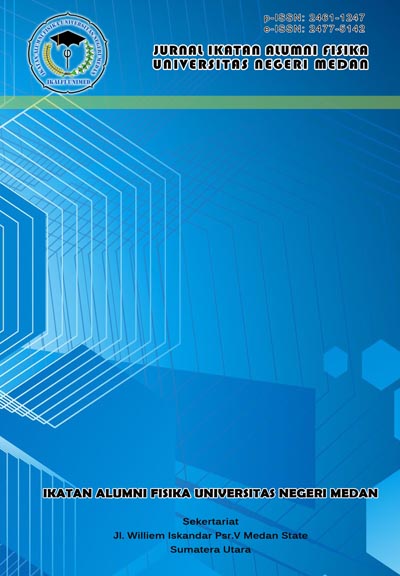PENGARUH MODEL PEMBELAJARAN BERDASARKAN MASALAH BERBANTUAN MIND MAPPING TERHADAP HASIL BELAJAR SISWA PADA MATERI POKOK KARAKTERISTIK ZAT DI KELAS VII SMP NEGERI 3 PERCUT SEI TUAN T. P 2016/2017
DOI:
https://doi.org/10.24114/jiaf.v3i2.10737Keywords:
problem based learning models, mind mapping, learning outcomesAbstract
This study aims to determine the effect of problem based learning models for the outcomes of student learning in Characteristics of Substance subject in the first half semester of class VII SMP Negeri 3 Percut Sei Tuan year 2016/2017. This study is a quasi- experimental design by using two group pretest - posttest desain and using odd semester students of class VII SMP Negeri 3 Percut Sei Tuan Deli Derdang as population, which consists of nine parallel classes. The study take two classes as samples by using Cluster Random Sampling technique. The selected sample is class VI1-6 as experiment class dan class VII-1 as the control class with total 35 students in each class. Result data in the study is collected using essay test with total ten questions. The questions which will be used as research instrument is used after content validation process, observation sheet, and hypothesis test using t test. The results showed the average pretest score of experiment class was 33.77 with a standard deviation 5.87 and the average pretest score of control class was 32.83 with a standard deviation 5,52. Outcomes data after the treatment (post-test) in experiment class is 78.34 as average score and a standard deviation 8.69 which classified as high category; and outcomes data in control class is 64.60 as average score and a standard deviation 11.42. From the statistical test, the study obtained tcoum = 5,56 > ttabie = 1,99, a = 0.05. Ha is accepted and H0 is rejected, so it can be concluded that the hypothesis "there is no effect of problem based learning model to the learning outcomes of students in the characteristics of the substance subject in class VII SMP Negeri 3 Percut Sei Tuan" is accepted.References
Abdurrahman, Mulyono, (1999), Pendidikan Bagi Anak Berkesulitan Belajar, Rineka Cipta, Jakarta
Arends, R. I., (2008), Learning to Teach (Belajar untuk Mengajar), Pustaka Pelajar, Yogyakarta
Arikunto, S.; (2012), Prosedur Penelitian Suatu Pendekatan Praktik, Ed Revisi, PT Rineka Cipta, Jakarta.
Dimyati, Mujiono, (2009), Belajar dan
Pembelajaran. Rineka Cipta, Jakarta
Dwi, I. M., Arif, H., Sentot, K., (2013), Pengaruh Strategi Problem Based Learning Berbasis ICT terhadap Pemahaman Konsep dan Kemampuan Pemecahan Masalah Fisika, Jurnal Pendidikan Fisika Indonesia, 9: 8-17
Djamarah, S. B., Zain, A., (2006) ,Strategi Belajar Mengajar, PT Rineka Cipta, Jakarta.
Djamarah, S. B., Zain, A., (2013), Strategi Belajar Mengajar, PT Rineka Cipta, Jakarta.
Hartini, T. I., (2014), Pengaruh Berpikir Kreatif dengan Model Problem Based Learning (PBL) terhadap Prestasi Belajar Fisika Siswa dengan Menggunakan Test Open Ended, Jurnal Pendidikan IPA Indonesia,: Universitas Negeri Semarang
Henry, G,dkk, 2013. IPA untuk SMP/MTs kelas VII. Jakarta: Dapartemen Pendidikan Nasional Sanjaya, W, (200$),Strategi Pembelajaran Berorientasi Standard Proses Pendidikan. Kencana, Jakarta. Sardiman, (1986), Interaksi dan Motivasi Belajar Mengajar, PT Raja Grafindo Jakarta.
Sardiman, (2011), Interaksi dan Motivasi Belajar Mengajar, Rajawali Pers, Jakarta.
Slameto, (2010), Belajar dan Faktor- Faktor yang Mempengaruhi, PT Rineka Cipta, Jakarta.
Sudjana, (2005). Metoda Statistika, Ed ke- 6, Tarsito Bandung, Bandung.
Sudjana, (2009). Penilaian Hasil Proses Belajar Mengajar. PT Bumi Aksara. Jakarta
Swadarma, D., (2013), Penerapan Mind Mapping dalam Kurikulum Pembelajaran,. Elex Media Komputindo, Jakarta.
Trianto, (2009), Mendesain Model Pembelajaran Inovatif-Progressif, Kencana, Jakarta.
Trianto,(2011),Mendesain Model Pembelajaran Inovatif-Progresif, Kencana, Jakarta
Downloads
Published
Issue
Section
License
Copyright (c) 2018 JURNAL IKATAN ALUMNI FISIKA

This work is licensed under a Creative Commons Attribution 4.0 International License.
Authors who publish with this journal agree to the following terms:- Authors retain copyright and grant the journal right of first publication with the work simultaneously licensed under a Creative Commons Attribution License that allows others to share the work with an acknowledgement of the work's authorship and initial publication in this journal.
- Authors are able to enter into separate, additional contractual arrangements for the non-exclusive distribution of the journal's published version of the work (e.g., post it to an institutional repository or publish it in a book), with an acknowledgement of its initial publication in this journal.
- Authors are permitted and encouraged to post their work online (e.g., in institutional repositories or on their website) prior to and during the submission process, as it can lead to productive exchanges, as well as earlier and greater citation of published work (See The Effect of Open Access).

